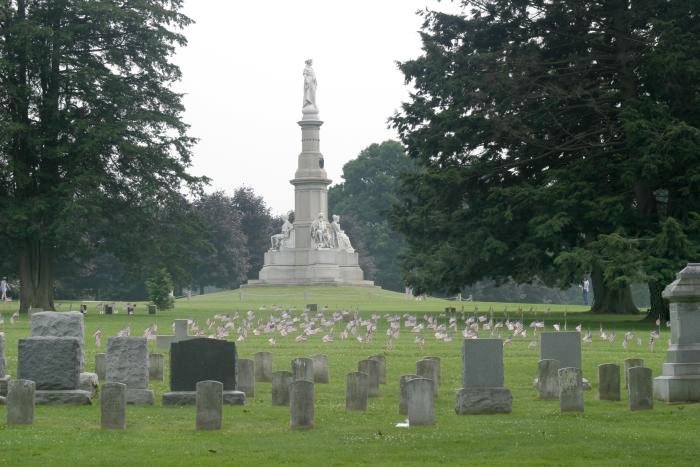
 |
NAVIGATION
|
NEWS TIPS!RightMichigan.com

Who are the NERD fund donors Mr Snyder?Tweets about "#RightMi, -YoungLibertyMI, -dennislennox,"

 |
A Century And A Half Ago TodayBy Kevin Rex Heine, Section News
The Battle of Gettysburg (July 1-3, 1863), generally considered the turning point of the American Civil War, has also the distinction of having the highest casualty count of the entire war (46,286 combined, approximately evenly split between Union and Confederate).
The Consecration of the National Cemetery at Gettysburg was originally planned for October 23rd, 1863, but delayed four weeks so that the featured speaker could properly prepare. On the afternoon of November 19th, 1863, with a crowd of about 15,000 (and perhaps as large as 50,000, by one estimate) in attendance at Evergreen Cemetery, including several dignitaries, the keynote address was delivered:
Standing beneath this serene sky, overlooking these broad fields now reposing from the labors of the waning year, the mighty Alleghenies dimly towering before us, the graves of our brethren beneath our feet, it is with hesitation that I raise my poor voice to break the eloquent silence of God and Nature. But the duty to which you have called me must be performed; -- grant me, I pray you, your indulgence and your sympathy. ... Not the speech you remember? Yeah, thought so.

Edward Everett was widely regarded at the time as our nation's greatest orator. His Gettysburg Oration was 13,607 words in length and, according to the Daily Illinois State Journal, required two hours and four minutes to deliver. In those days, lengthy dedication speeches were common practice, and this one was well received. However, even though multiple copies of the oration were advance-circulated to the press in attendance, so far as I know, only the New York Times printed the speech in its entirety. It's now a seldom-read footnote, fascinating only to serious students of history.
President Abraham Lincoln, who was not feeling well (and later discovered to have been in the prodromal period of a mild case of smallpox), then delivered some "dedicatory remarks" from handwritten notes that he'd drafted only that morning. The ten-sentence Gettysburg Address was met with a thunderous ovation at the time, but received mixed reviews in the press immediately following. Nevertheless, Lincoln's carefully crafted address, secondary to other presentations that day, came to be regarded so highly that Everett later wrote Lincoln, "I should be glad if I could flatter myself that I came as near to the central idea of the occasion, in two hours, as you did in two minutes." No copies were circulated to the media, so press transcriptions vary (at least three different variants were in general circulation), none known to match either the Nicolay draft or the Hay draft (the two Lincoln autographs from the date of the ceremony). Of the five versions known to exist, the Bliss copy is generally regarded as the official version of the speech, though the Everett draft/copy most closely matches the press transcriptions.
Address delivered at the dedication of the cemetery at Gettysburg. Our work isn't yet done in this regard, as honest patriots find themselves again engaged in a great struggle testing whether our nation will continue to endure as "a more perfect union," or whether a "nation so conceived and so dedicated" will cease to endure in another generation or so.
A Century And A Half Ago Today | 0 comments ( topical, 0 hidden)
|
Related Links+ Battle of Gettysburg+ American Civil War + Consecrati on of the National Cemetery at Gettysburg + Edward Everett + Gettysburg Oration + according to the Daily Illinois State Journal + only the New York Times printed the speech in its entirety + Abraham Lincoln + dedicatory remarks + Gettysburg Address + Nicolay draft + Hay draft + five versions known to exist + Bliss copy + Everett draft/copy + Also by Kevin Rex Heine |